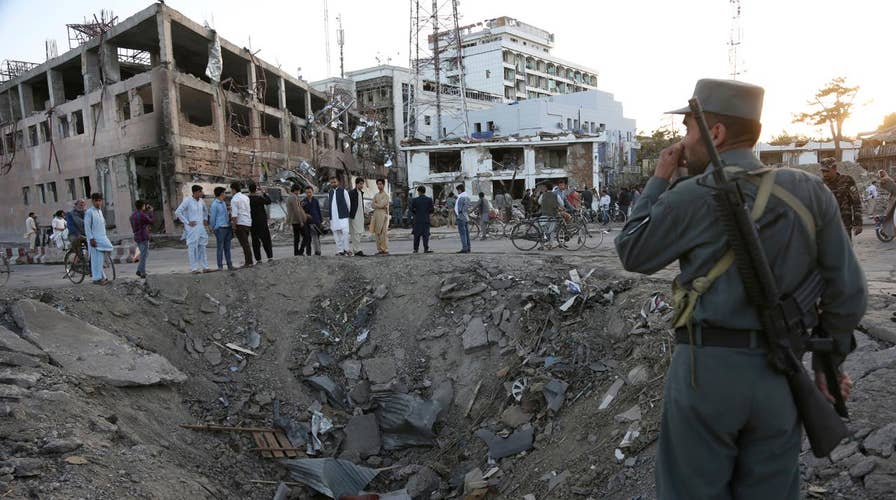Death toll rises from massive vehicle bomb in Kabul
Blast rocks diplomatic area of Afghanistan's capital; Conor Powell reports from Jerusalem
Nearly a dozen United States citizens were among the 400 people wounded when a massive explosion rocked a highly secure diplomatic area in Kabul on Wednesday, killing at least 90 people.
There were 11 U.S. citizens -- all contract personnel -- injured in the blast and one Afghan local guard was reported missing, a senior U.S. official told Fox News. Nine Afghan guards working for a U.S.-contracted security company were killed.
No group has claimed responsibility for the blast, believed to be caused by a suicide bombing, though both the Taliban and the Islamic State group have staged large-scale attacks in the Afghan capital in the past.
The Taliban later Wednesday issued a statement denying any involvement and condemning all attacks against civilians. Zabihullah Mujahid, spokesman for the Taliban, said the Kabul explosion had "nothing to do with the Mujahedeen of Islamic Emirate," as the Taliban call themselves.
The target of the explosion in the Wazir Akbar Khan area was not immediately known, but Ismail Kawasi, spokesman of the public health ministry, said most of the casualties were civilians, including women and children.
It was one of the worst attacks Kabul had seen since the drawdown of foreign forces from the country at the end of 2014. The bombing also raised serious questions about the Afghan government's ability to secure the war-battered nation.
"We don't know at this moment what was the target of the attack, but most of the casualties are civilians," said Najib Danish, deputy spokesman for the Interior Ministry.
Germany’s Foreign Minister Signmar Gabriel said employees of the German Embassy in Kabul were wounded and an Afghan security guard was killed. The Foreign Ministry activated a crisis team to help deal with the aftermath
Windows were shattered in shops, restaurants and other buildings up to a half mile from the blast site.
"There are a large number of casualties, but I don't know, how many people are killed or wounded," said an eyewitness at the site, Gul Rahim.
The blast comes a day after a massive bomb outside a popular ice cream parlor in central Baghdad and a rush hour car bomb in another downtown area killed at least 31 people in Iraqi.
The neighborhood is considered Kabul's safest area, with foreign embassies protected by dozens of 10-foot-high blast walls and government offices, guarded by police and national security forces. The German Embassy, the Foreign Ministry and the Presidential Palace are all in the area, as are the British and the Canadian embassies. The Chinese, Turkish and Iranian embassies are also located there.
The U.S Embassy and the NATO mission in Kabul are also near, about a kilometer (half mile) away from the site. Both condemned the attack and the alliance praised "the courage of Afghan Security Forces, especially the police and first responders."
Afghan President Ashraf Ghani has strongly condemned the massive attack, saying in a statement "the terrorists, even in the holy month of Ramadan, the month of goodness, blessing and prayer, are not stopping the killing of our innocent people."
The Afghan media center quoted a statement from the Afghan Ulema Council, the country's top religious body that includes Muslim clerics, scholars and men of authority in religion and law, as giving the new casualty tolls.
The council strongly condemned the attack, saying that "carrying out such attacks in the holy month of Ramadan is completely against humanity."
The BBC said a driver for the British broadcaster was killed and four of its journalists were wounded. Afghanistan's private TOLO Television also reported a staffer killed; Germany said an Afghan security guard outside its embassy was among those killed.
Last month, the Afghan Taliban announced the beginning of their spring offensive, promising to build their political base in the country while focusing military assaults on the international coalition and Afghan security forces.
The United States now has more than 8,000 troops in Afghanistan, training local forces and conducting counterterrorism operations. In the past year, they have largely concentrated on thwarting a surge of attacks by the Taliban, who have captured key districts, such as Helmand province, which U.S. and British troops had fought bitterly to return to the government.
Fox News' Jennifer Griffin and The Associated Press contributed to this report









































